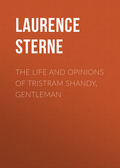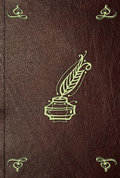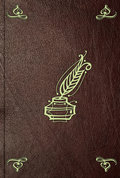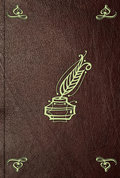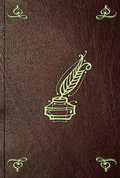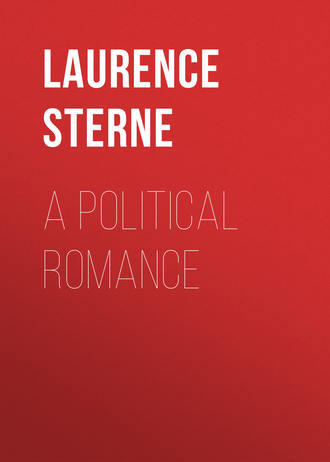
Лоренс Стерн
A Political Romance
This set the Mob a laughing, and sent every Man home in perfect good Humour, except Trim, who waddled very slowly off with that Kind of inflexible Gravity only to be equalled by one Animal in the whole Creation,—and surpassed by none, I am,
SIR, Yours, &c. &c.
FINIS
POSTSCRIPT
I have broke open my Letter to inform you, that I miss'd the Opportunity of sending it by the Messenger, who I expected would have called upon me in his Return through this Village to York, so it has laid a Week or ten Days by me.
–I am not sorry for the Disappointment, because something has since happened, in Continuation of this Affair, which I am thereby enabled to transmit to you, all under one Trouble.
When I finished the above Account, I thought (as did every Soul in the Parish) Trim had met with so thorough a Rebuff from John the ParishClerk and the Town's Folks, who all took against him, that Trim would be glad to be quiet, and let the Matter rest.
But, it seems, it is not half an Hour ago since Trim sallied forth again; and, having borrowed a Sow-Gelder's Horn, with hard Blowing he got the whole Town round him, and endeavoured to raise a Disturbance, and fight the whole Battle over again:—That he had been used in the last Fray worse than a Dog;—not by John the Parish-Clerk,—for I shou'd not, quoth Trim, have valued him a Rush single Hands:—But all the Town sided with him, and twelve Men in Buckram set upon me all at once, and kept me in Play at Sword's Point for three Hours together.—Besides, quoth Trim, there were two misbegotten Knaves in Kendal Green, who lay all the while in Ambush in John's own House, and they all sixteen came upon my Back, and let drive at me together.—A Plague, says Trim, of all Cowards!—Trim repeated this Story above a Dozen Times;—which made some of the Neighbours pity him, thinking the poor Fellow crack-brain'd, and that he actually believed what he said. After this Trim dropp'd the Affair of the Breeches, and begun a fresh Dispute about the Reading- Desk, which I told you had occasioned some small Dispute between the late Parson and John, some Years ago.
This Reading-Desk, as you will observe, was but an Episode wove into the main Story by the Bye;—for the main Affair was the Battle of the Breeches and Great Watch-Coat.—However, Trim being at last driven out of these two Citadels,—he has seized hold, in his Retreat, of this Reading-Desk, with a View, as it seems, to take Shelter behind it.
I cannot say but the Man has fought it out obstinately enough;—and, had his Cause been good, I should have really pitied him. For when he was driven out of the Great Watch-Coat,—you see, he did not run away;—no, —he retreated behind the Breeches;—and, when he could make nothing of it behind the Breeches,—he got behind the Reading-Desk.—To what other Hold Trim will next retreat, the Politicians of this Village are not agreed.—Some think his next Move will be towards the Rear of the Parson's Boot;—but, as it is thought he cannot make a long Stand there,—others are of Opinion, That Trim will once more in his Life get hold of the Parson's Horse, and charge upon him, or perhaps behind him. But as the Horse is not easy to be caught, the more general Opinion is, That, when he is driven out of the Reading-Desk, he will make his last Retreat in such a Manner as, if possible, to gain the Close-Stool, and defend himself behind it to the very last Drop. If Trim should make this Movement, by my Advice he should be left besides his Citadel, in full Possession of the Field of Battle;—where, 'tis certain, he will keep every Body a League off, and may pop by himself till he is weary: Besides, as Trim seems bent upon purging himself, and may have Abundance of foul Humours to work off, I think he cannot be better placed.
But this is all Matter of Speculation.—Let me carry you back to Matter of Fact, and tell you what Kind of a Stand Trim has actually made behind the said Desk.
"Neighbours and Townsmen all, I will be sworn before my Lord Mayor, That John and his nineteen Men in Buckram, have abused me worse than a Dog; for they told you that I play'd fast and go-loose with the late Parson and him, in that old Dispute of theirs about the Reading-Desk; and that I made Matters worse between them, and not better."
Of this Charge, Trim declared he was as innocent as the Child that was unborn: That he would be Book-sworn he had no Hand in it. He produced a strong Witness;—and, moreover, insinuated, that John himself, instead of being angry for what he had done in it, had actually thank'd him. Aye, Trim, says the Wight in the Plush Breeches, but that was, Trim, the Day before John found thee out.—Besides, Trim, there is nothing in that:—For, the very Year that thou wast made Town's Pinder, thou knowest well, that I both thank'd thee myself; and, moreover, gave thee a good warm Supper for turning John Lund's Cows and Horses out of my Hard-Corn Close; which if thou had'st not done, (as thou told'st me) I should have lost my whole Crop: Whereas, John Lund and Thomas Patt, who are both here to testify, and will take their Oaths on't, That thou thyself wast the very Man who set the Gate open; and, after all,—it was not thee, Trim,—'twas the Blacksmith's poor Lad who turn'd them out: So that a Man may be thank'd and rewarded too for a good Turn which he never did, nor ever did intend.
Trim could not sustain this unexpected Stroke;—so Trim march'd off the Field, without Colours flying, or his Horn sounding, or any other Ensigns of Honour whatever.
Whether after this Trim intends to rally a second Time, or whether Trim may not take it into his Head to claim the Victory,—no one but Trim himself can inform you:—However, the general Opinion, upon the whole, is this, That, in three several pitch'd Battles, Trim has been so trimm'd, as never disastrous Hero was trimm'd before him.
THE KEY
This Romance was, by some Mischance or other, dropp'd in the MinsterYard, York, and pick'd up by a Member of a small Political Club in that City; where it was carried, and publickly read to the Members the last Club Night.
It was instantly agreed to, by a great Majority, That it was a Political Romance; but concerning what State or Potentate, could not so easily be settled amongst them.
The President of the Night, who is thought to be as clear and quick- lighted as any one of the whole Club in Things of this Nature, discovered plainly, That the Disturbances therein set forth, related to those on the Continent:—That Trim could be Nobody but the King of France, by whole shifting and intriguing Behaviour, all Europe was set together by the Ears:—That Trim's Wife was certainly the Empress, who are as kind together, says he, as any Man and Wife can be for their Lives.—The more Shame for 'em, says an Alderman, low to himself.– Agreeable to this Key, continues the President,—The Parson, who I think is a most excellent Character,—is His Most Excellent Majesty King George;—John, the Parish-Clerk, is the King of Prussia; who, by the Manner of his first entering Saxony, shew'd the World most evidently,– That he did know how to lead out the Psalm, and in Tune and Time too, notwithstanding Trim's vile Insult upon him in that Particular.—But who do you think, says a Surgeon and Man-Midwife, who sat next him, (whose Coat-Button the President, in the Earnestness of this Explanation, had got fast hold of, and had thereby partly drawn him over to his Opinion) Who do you think, Mr. President, says he, are meant by the Church- Wardens, Sides-Men, Mark Slender, Lorry Slim, &c.—Who do I think? says he, Why,—Why, Sir, as I take the Thing,—the Church-Wardens and Sides- Men, are the Electors and the other Princes who form the Germanick Body.—And as for the other subordinate Characters of Mark Slim,—the unlucky Wight in the Plush Breeches,—the Parson's Man who was so often out of the Way, &c. &c.—these, to be sure, are the several Marshals and Generals, who fought, or should have fought, under them the last Campaign.—The Men in Buckram, continued the President, are the Grofs of the King of Prussia's Army, who are as stiff a Body of Men as are in the World:—And Trim's saying they were twelve, and then nineteen, is a Wipe for the Brussels Gazetteer, who, to my Knowledge, was never two Weeks in the same Story, about that or any thing else.
As for the rest of the Romance, continued the President, it sufficiently explains itself,—The Old-cast-Pair-of-Black-Plush-Breeches must be Saxony, which the Elector, you see, has left of wearing:—And as for the Great Watch-Coat, which, you know, covers all, it signifies all Europe; comprehending, at least, so many of its different States and Dominions, as we have any Concern with in the present War.
I protest, says a Gentleman who sat next but one to the President, and who, it seems, was the Parson of the Parish, a Member not only of the Political, but also of a Musical Club in the next Street;—I protest, says he, if this Explanation is right, which I think it is, That the whole makes a very fine Symbol.—You have always some Musical Instrument or other in your Head, I think, says the Alderman.—Musical instrument! replies the Parson, in Astonishment,—Mr. Alderman, I mean an Allegory; and I think the greedy Disposition of Trim and his Wife, in ripping the Great Watch-Coat to Pieces, in order to convert it into a Petticoat for the one, and a Jerkin for the other, is one of the most beautiful of the Kind I ever met with; and will shew all the World what have been the true Views and Intentions of the Houses of Bourbon and Austria in this abominable Coalition,—I might have called it Whoredom:—Nay, says the Alderman, 'tis downright Adulterydom, or nothing.
This Hypothesis of the President's explain'd every Thing in the Romance extreamly well; and, withall, was delivered with so much Readiness and Air of Certainty, as begot an Opinion in two Thirds of the Club, that Mr. President was actually the Author of the Romance himself: But a Gentleman who sat on the opposite Side of the Table, who had come piping-hot from reading the History of King William's and Queen Anne's Wars, and who was thought, at the Bottom, to envy the President the Honour both of the Romance and Explanation too, gave an entire new Turn to it all. He acquainted the Club, That Mr. President was altogether wrong in every Supposition he had made, except that one, where the Great Watch-Coat was said by him to represent Europe, or at least a great Part of it:—So far he acknowledged he was pretty right; but that he had not gone far enough backwards into our History to come at the Truth. He then acquainted them, that the dividing the Great Watch-Coat did, and could, allude to nothing else in the World but the Partition-Treaty; which, by the Bye, he told them, was the most unhappy and scandalous Transaction in all King William's Life: It was that false Step, and that only, says he, rising from his Chair, and striking his Hand upon the Table with great Violence; it was that false Step, says he, knitting his Brows and throwing his Pipe down upon the Ground, that has laid the Foundation of all the Disturbances and Sorrows we feel and lament at this very Hour; and as for Trim's giving up the Breeches, look ye, it is almost Word for Word copied from the French King and Dauphin's Renunciation of Spain and the West-Indies, which all the World knew (as was the very Case of the Breeches) were renounced by them on purpose to be reclaim'd when Time should serve.



